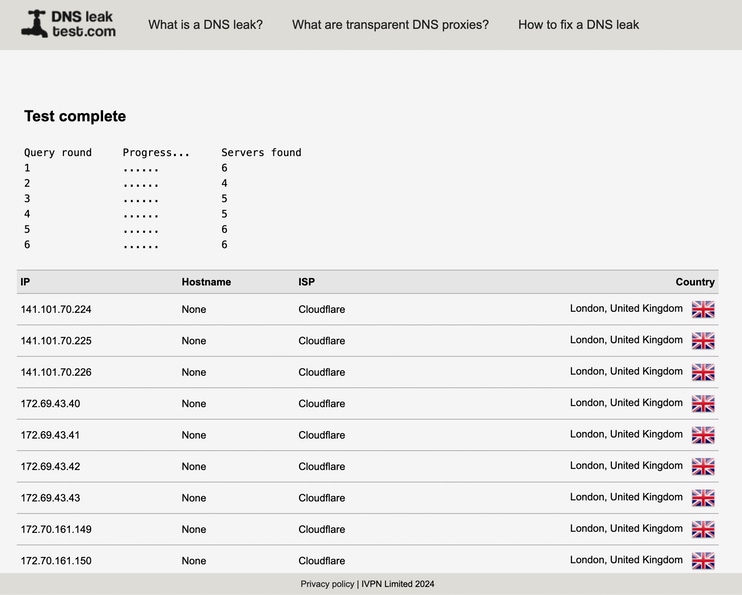How to Prevent DNS Leaks
Hey there, privacy enthusiast! Ever wondered if your VPN is really keeping all your online activities under wraps? Let's dive into the world of DNS leaks, learn how to test for them, and discover ways to prevent them. Don't worry, we'll keep things simple and actionable!
What's a DNS Leak, Anyway?
Imagine the internet as a massive library. DNS (Domain Name System) is like the librarian who helps you find the right book (website) when you only know the title (domain name). Normally, when you're using a VPN, this librarian should be working for your VPN service. But sometimes, they might accidentally ask your regular internet provider instead – that's a DNS leak!

Why Should You Care?
Here's the deal: even if you're using a VPN, a DNS leak can still reveal which websites you're visiting to your Internet Service Provider (ISP) or other prying eyes. It's like having an invisibility cloak with a hole in it – not ideal for keeping your online adventures private!
How to Test for DNS Leaks
Before we dive into prevention, let's learn how to identify if you have a DNS leak. Follow these steps:
- Connect to any VPN service you're currently using.
- Visit dnsleaktest.com in your web browser.
- Click on "Extended Test" to run a comprehensive check.
- Wait for the test to conclude.
- Examine the results. If you see DNS servers from your local country or ISP, you have a DNS leak.
A DNS leak means your ISP or government might be able to see your online activity, even when using a VPN.
Example: Tegant VPN XRay Protocol Tested in Iran
To illustrate what a successful DNS leak prevention looks like, let's examine a real-world test of Tegant VPN's XRay protocol conducted in Iran:

In this test, a user in Iran connected to Tegant VPN's XRay server in London, UK. The DNS leak test results show only UK flags, indicating that all DNS queries are being routed through the VPN. There's no sign of any Iranian DNS servers, confirming that no DNS leak is occurring. This means the user's online activity remains private and secure from local ISP or government surveillance.
How to Prevent DNS Leaks
Now that you know how to test for DNS leaks, let's explore some ways to prevent them:
-
Choose a VPN with Built-in DNS Leak Protection
Look for VPN services that offer integrated DNS leak protection. For example, Tegant VPN provides robust DNS leak prevention in both its WireGuard and XRay protocols.
-
Regularly Test Your VPN
Make it a habit to periodically check for DNS leaks using tools like dnsleaktest.com or ipleak.net.
-
Use Advanced VPN Protocols
Opt for VPN services that offer modern, secure protocols. Tegant's implementation of WireGuard and XRay protocols, for instance, ensures a secure and leak-free connection.
Additional Tips to Enhance Your Privacy
- Avoid Manual Configurations: Stick with your VPN's default settings unless you're an advanced user.
- Keep Your VPN App Updated: Regular updates often include security enhancements and bug fixes.
Why Consider Tegant VPN for DNS Leak Protection
While there are many VPN services available, Tegant VPN stands out for several reasons:
- Advanced Protocols: Both our WireGuard and XRay protocols offer robust protection against DNS leaks.
- No-Logs Policy: We don't keep any records of your online activities, enhancing your privacy.
- User-Friendly Interface: Our app makes it easy to connect and stay protected without complex setups.
- Regular Updates: We continuously improve our service to stay ahead of potential privacy threats.
Wrap-Up
DNS leaks can be a real pain for your online privacy, but with the right tools and knowledge, you can plug those leaks for good. By choosing a robust VPN like Tegant, you're not just preventing DNS leaks – you're embracing a whole new level of digital freedom and security.
Remember, in the world of online privacy, a little prevention goes a long way. Stay safe out there, and happy browsing!
Ready to Secure Your Online Privacy?
Take control of your digital life and prevent DNS leaks with Tegant VPN. Visit our main page to learn more about our comprehensive VPN solutions and start your journey to truly private browsing today!
Ready to give it a whirl?

